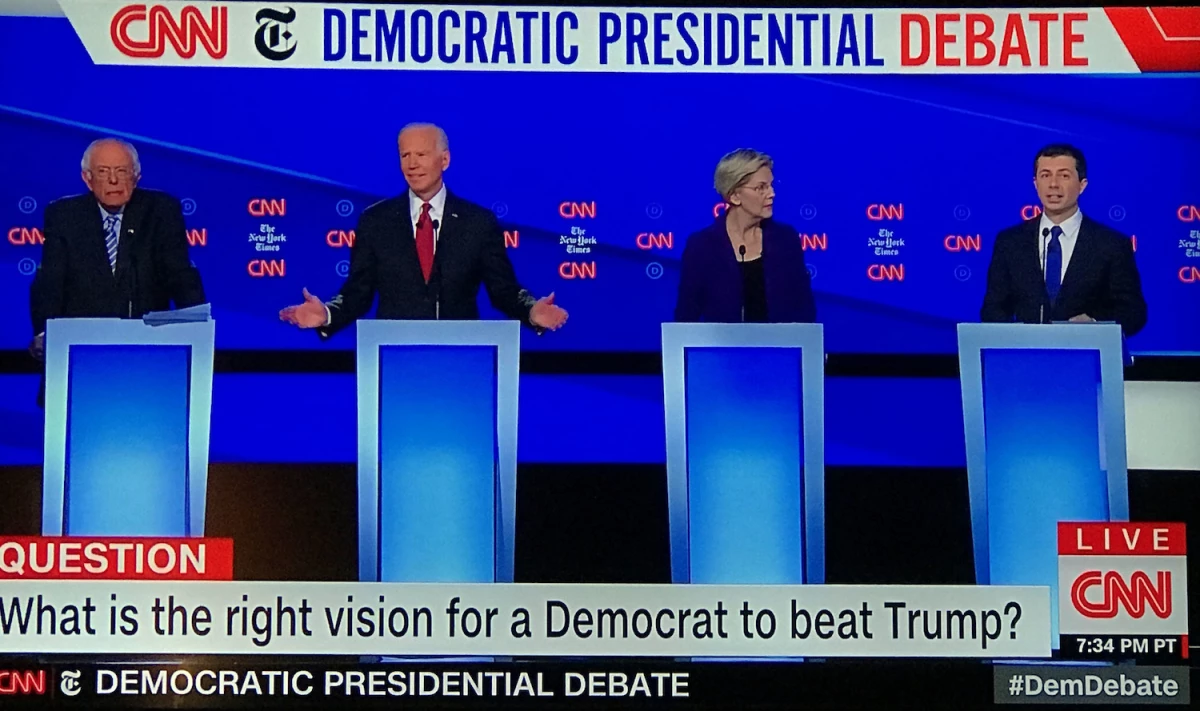- Home /
- Research /
- Reports & Analysis /
- Debate Twitter: Mapping User Reactions to the 2020 Democratic Presidential Primary Debates
Debate Twitter: Mapping User Reactions to the 2020 Democratic Presidential Primary Debates
As the largest Democratic primary field in modern history continues to narrow, we wanted to examine how the debates drove the conversation online, and specifically how voters changed their opinions over time.

Credit: Flickr
Area of Study
Tags
Summary
The Center for Social Media and Politics at New York University collected and analyzed Twitter data to explore and understand user reactions to the 2020 Democratic Presidential Primary debates.
Our corpus contained a total of 11,286,346 tweets by 1,724,306 unique Twitter users, collected over the course of the first nine debates, which spanned across 11 nights from June 26 to February 19.
We investigated the following broad research questions:
How did candidates’ discussions on the debate stage compare to Twitter users’ discussions?
Did candidates discuss topics that resonated with users?
How did the behavior of users in key battleground states compare to that of other users?
How did users’ behavior change across the debates — especially when candidates they were most interested in dropped out?
Our research methods are as follows: We used a keyword-based method to calculate the number of times a candidate was mentioned in our corpus.
We classified the tweets into 22 policy issues and focused on the eight most popular ones among users tweeting about the debates: civil rights, the economy, education, the environment, healthcare, immigration, international affairs, and law and crime.
We estimated the gender of 63% of users in corpus using a method proposed by Blevins and Mullen (2015) and U.S. Social Security Administration data.
We used Barberá’s method (2015) to generate a one-dimensional, left-to-right political affinity score based on relevant Twitter accounts a user follows, including media outlets, elected officials, pundits, political organizations, and non-profit organizations.
We estimated the location of users in the United States, focusing on those in six swing states: Arizona, Florida, Michigan, 5 North Carolina, Pennsylvania, and Wisconsin.
Key findings:
The number of new unique users tweeting about the debates dropped through debates 3 and 4, then plateaued through debates 5 through 8 at a steady stream of approximately 75,000 new users per debate. Debate 9, however, brought out 125,000 new users.
Following a long period of decline, tweets about the debates spiked by 38% after February 19 — which was the date of the first debate after the New Hampshire primary, and the first debate former mayor of New York City Mike Bloomberg participated in.
Most tweets about the debates did not mention policy topics, but those that did mentioned civil rights (20%) and healthcare (18%) at higher rates than they did other topics.
Conservatives were more likely to tweet about immigration and the economy, while liberals were more likely to tweet about civil rights, education, and the environment. Men and women were nearly equally likely to tweet about the same policy issues.
There were no “breakout topics” on Twitter: No single candidate discussed a policy issue during the debate that generated significantly more online discussion afterward.
Tweets about policy topics kept pace with the rate at which those same policy topics were mentioned by candidates during the debates, with two notable exceptions:
Users tweeted about law and crime more than the candidates discussed law and crime.
Users tweeted about education less than the candidates discussed education.
Twitter users in swing states (Arizona, Florida, Michigan, North Carolina, Pennsylvania, and Wisconsin) did not differ from users in non-swing states in the policy topics they tweeted about, nor did they differ in the number of times they mentioned each candidate.
Users who tweeted about Sen. Kamala Harris (D-CA) more than any other candidate during her participation in the debates began tweeting more about Sen. Amy Klobuchar (D-MN) and Sen. Bernie Sanders (D-VT) after Harris ended her candidacy.
Like users who tweeted more about Harris, users who tweeted about Sen. Cory Booker (D-NJ) more than any other candidate during his participation in the debates began tweeting more about Klobuchar and Sanders after Booker ended his candidacy